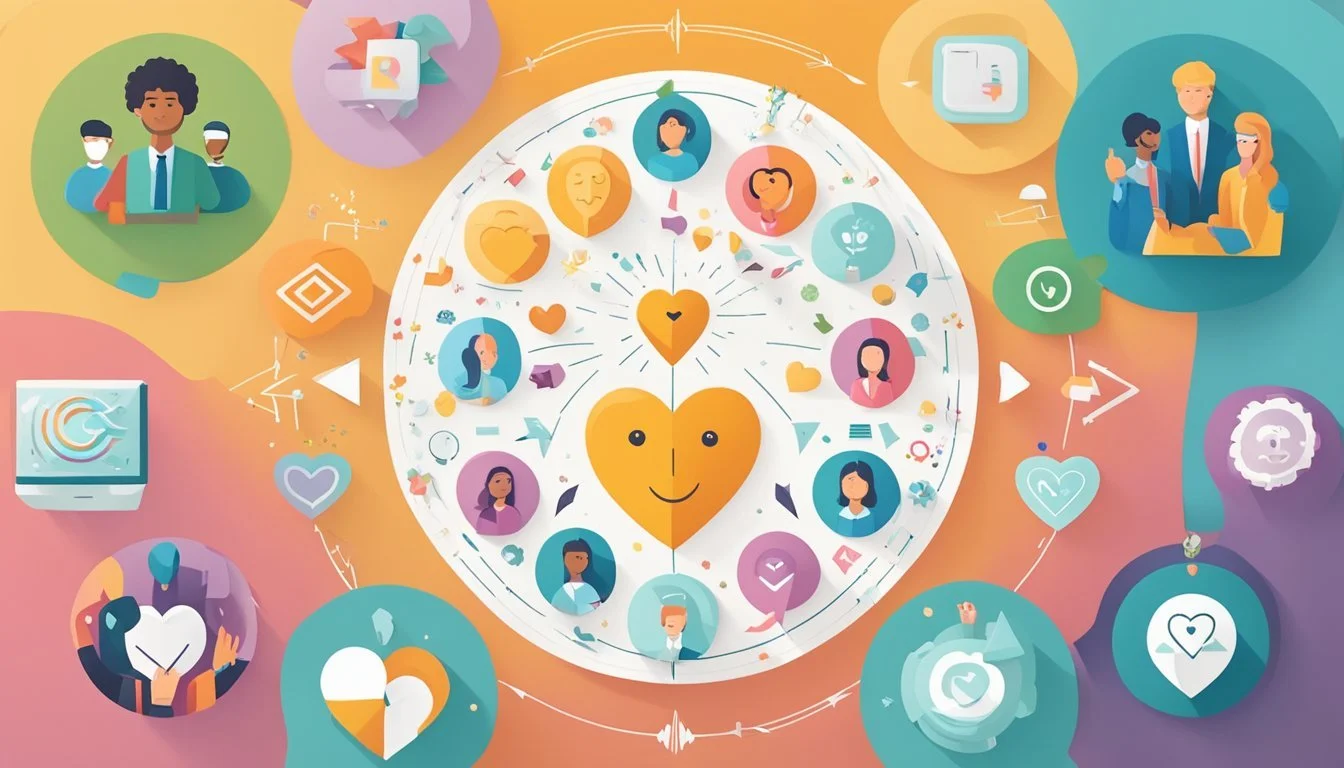8 Ways to Boost Your Emotional Intelligence
Simple Techniques for Personal Growth
Emotional intelligence plays a crucial role in personal and professional success. It encompasses the ability to recognize, understand, and manage emotions in oneself and others. Developing emotional intelligence can lead to improved relationships, better decision-making, and enhanced leadership skills.
Boosting emotional intelligence is a skill that can be learned and refined over time. This article explores practical strategies for increasing emotional awareness and competence. By implementing these techniques, individuals can enhance their capacity to navigate social interactions, handle stress, and achieve their goals more effectively.
1) Practice Self-Awareness
Self-awareness forms the foundation of emotional intelligence. It involves recognizing and understanding one's own emotions, thoughts, and behaviors. Individuals can develop this skill through regular self-reflection and mindfulness practices.
Keeping a thought diary is an effective way to increase self-awareness. By recording automatic reactions and the situations that trigger them, people can identify patterns in their emotional responses. This practice helps uncover underlying beliefs and attitudes that shape behavior.
Active listening is another powerful tool for enhancing self-awareness. By paying close attention to internal dialogues and physical sensations, individuals can gain deeper insights into their emotional states. This heightened awareness allows for more conscious decision-making and improved emotional regulation.
Seeking feedback from trusted colleagues, friends, or family members can provide valuable external perspectives. This input helps bridge the gap between self-perception and how others perceive one's emotional intelligence. It can reveal blind spots and areas for improvement that may not be apparent through self-reflection alone.
2) Develop Active Listening Skills
Active listening is a crucial component of emotional intelligence. It involves fully concentrating on the speaker, understanding their message, and responding thoughtfully. This skill helps build stronger relationships and improves communication.
To practice active listening, focus entirely on the person speaking. Maintain eye contact and use nonverbal cues like nodding to show engagement. Avoid interrupting or formulating responses while the other person is talking.
Pay attention to the speaker's tone of voice and body language. These nonverbal cues often convey additional information about their emotional state and intentions. Empathize with their perspective, even if it differs from your own.
Ask clarifying questions to ensure understanding. Paraphrase key points to confirm accurate comprehension. This demonstrates that you value the speaker's input and are actively processing the information.
By developing active listening skills, individuals can enhance their emotional intelligence. It fosters better communication, builds trust, and allows for more meaningful interactions in both personal and professional settings.
3) Cultivate Empathy
Empathy is a crucial component of emotional intelligence. It involves understanding and sharing the feelings of others. Developing empathy can significantly enhance one's ability to connect with people and navigate social situations.
One effective way to cultivate empathy is through active listening. This means giving full attention to the speaker and trying to understand their perspective without judgment. Practice focusing on the other person's words and emotions rather than formulating a response.
Reading literary fiction can also boost empathy. Studies suggest that engaging with fictional characters and their experiences can improve one's ability to understand others' thoughts and feelings in real life.
Curiosity plays a role in developing empathy. Approaching interactions with genuine interest in others' viewpoints can lead to deeper understanding and connection. Ask questions and seek to learn about different experiences and perspectives.
Practicing mindfulness can enhance empathy by increasing self-awareness and reducing personal biases. Regular meditation or mindfulness exercises can help individuals become more attuned to their own emotions and those of others.
Seeking diverse experiences and interacting with people from various backgrounds can broaden one's empathetic capacity. Exposure to different cultures, lifestyles, and viewpoints can foster a more inclusive and understanding mindset.
4) Manage Stress Effectively
Effective stress management is crucial for boosting emotional intelligence. Recognizing stress triggers and implementing coping strategies can significantly improve emotional regulation.
Deep breathing exercises are a simple yet powerful technique to reduce stress. Taking slow, deliberate breaths activates the body's relaxation response, helping to calm the mind and body.
Physical activity is another excellent stress-buster. Regular exercise releases endorphins, which can elevate mood and reduce anxiety. Even a short walk can provide immediate stress relief.
Mindfulness practices, such as meditation or yoga, can help individuals stay present and avoid dwelling on stressful thoughts. These techniques promote a sense of calm and clarity.
Time management skills are essential for preventing stress buildup. Prioritizing tasks, setting realistic goals, and avoiding procrastination can minimize feelings of overwhelm.
Creating a support network is valuable for managing stress. Talking to trusted friends, family members, or a therapist can provide perspective and emotional relief during challenging times.
Engaging in enjoyable activities or hobbies can serve as a healthy distraction from stressors. This allows the mind to reset and approach problems with renewed energy.
5) Enhance Emotional Regulation
Emotional regulation is a crucial aspect of emotional intelligence. It involves managing and controlling one's emotional responses to various situations. Developing this skill allows individuals to navigate challenging circumstances more effectively.
One key strategy for improving emotional regulation is practicing mindfulness. This technique helps people become more aware of their emotions in the present moment. By observing feelings without judgment, individuals can respond more thoughtfully rather than reactively.
Deep breathing exercises can also aid in emotional regulation. Taking slow, deliberate breaths activates the body's relaxation response, helping to calm intense emotions. This simple practice can be done anywhere, anytime.
Another effective approach is cognitive reframing. This involves reassessing situations from different perspectives to change emotional responses. By challenging negative thought patterns, individuals can develop more balanced emotional reactions.
Regular physical exercise contributes to better emotional regulation. It releases endorphins, which can improve mood and reduce stress. Even short bursts of activity can have a positive impact on emotional well-being.
Developing a strong support network is also beneficial. Sharing feelings with trusted friends or family members can provide valuable emotional outlets and different viewpoints on challenging situations.
6) Improve Communication Skills
Effective communication is a cornerstone of emotional intelligence. It involves expressing thoughts and feelings clearly while also listening attentively to others.
Practicing active listening can significantly enhance communication skills. This means focusing fully on the speaker, avoiding interruptions, and seeking to understand their perspective.
Nonverbal cues play a crucial role in communication. Being aware of body language, facial expressions, and tone of voice can help convey messages more accurately and interpret others' emotions better.
Developing assertiveness allows for clear and respectful expression of needs and opinions. It involves finding a balance between being passive and aggressive in communication.
Empathy is essential for effective communication. Putting oneself in others' shoes helps in understanding their feelings and responding appropriately.
Improving written communication is also important. Clear, concise emails and messages can prevent misunderstandings and foster better relationships in professional settings.
Regular practice and seeking feedback can help refine communication skills over time. This might involve role-playing scenarios or asking trusted colleagues for honest input.
7) Build Strong Relationships
Building strong relationships is a key aspect of emotional intelligence. People with high EQ tend to form deeper connections and maintain healthier relationships with others.
Effective communication plays a vital role in relationship-building. This includes active listening, expressing oneself clearly, and being attentive to non-verbal cues.
Empathy is another crucial component. Understanding and sharing the feelings of others fosters trust and strengthens bonds. It allows individuals to respond appropriately to others' emotional needs.
Conflict resolution skills are essential for maintaining strong relationships. Emotionally intelligent people approach disagreements with a calm and rational mindset, seeking mutually beneficial solutions.
Practicing forgiveness and letting go of grudges contributes to relationship longevity. It demonstrates emotional maturity and the ability to move past difficulties.
Showing appreciation and expressing gratitude regularly helps nurture positive connections. Recognizing others' efforts and contributions fosters a supportive environment.
Respecting boundaries and individual differences is also important. This involves acknowledging and honoring personal limits and diverse perspectives within relationships.
8) Seek Feedback Regularly
Regularly seeking feedback is crucial for enhancing emotional intelligence. Asking for input from colleagues, friends, and family members provides valuable insights into one's behavior and impact on others.
Constructive feedback helps identify blind spots in emotional awareness and interpersonal skills. It offers fresh perspectives on how one's actions and reactions are perceived by others.
360-degree assessments can be particularly useful for gathering comprehensive feedback. These evaluations compare self-perceptions with observations from supervisors, peers, and direct reports.
Actively listening to feedback without becoming defensive is key. Embracing both positive and negative input allows for continuous growth and improvement in emotional intelligence.
Implementing changes based on feedback demonstrates a commitment to personal development. It shows others that their input is valued and taken seriously.
Seeking feedback should be an ongoing process. Regular check-ins and follow-ups help track progress and identify areas that may need further attention.
Understanding Emotional Intelligence
Emotional intelligence encompasses the ability to recognize, understand, and manage emotions in oneself and others. It plays a crucial role in personal and professional relationships, decision-making, and overall well-being.
Definition and Importance
Emotional intelligence (EQ) refers to the capacity to identify, evaluate, and regulate emotions effectively. It involves perceiving and interpreting emotional cues, using emotions to facilitate thinking, and managing emotions to achieve desired outcomes.
EQ is vital in various aspects of life:
Improved communication and relationships
Enhanced leadership skills
Better stress management
Increased empathy and social awareness
Higher job performance and satisfaction
Developing emotional intelligence can lead to greater success in personal and professional endeavors. It enables individuals to navigate complex social situations, resolve conflicts, and make more informed decisions.
Components of Emotional Intelligence
Emotional intelligence comprises five key components:
Self-awareness: Recognizing one's emotions and their impact
Self-regulation: Managing emotions and impulses effectively
Motivation: Using emotions to drive goal achievement
Empathy: Understanding and responding to others' emotions
Social skills: Building and maintaining relationships
Self-awareness forms the foundation of EQ. It involves identifying emotions as they occur and understanding their underlying causes. This awareness allows for better self-regulation and emotional management.
Empathy and social skills are essential for interpersonal relationships. They enable individuals to connect with others, interpret non-verbal cues, and respond appropriately in social situations.
Developing these components can significantly enhance overall emotional intelligence. Regular practice and self-reflection are key to improving EQ skills over time.
Benefits of High Emotional Intelligence
Emotional intelligence offers significant advantages in both personal and professional spheres. It enhances relationships, improves decision-making, and fosters career success.
Personal Advantages
High emotional intelligence leads to better self-awareness and self-regulation. Individuals can recognize and manage their emotions effectively, reducing stress and anxiety.
They develop stronger interpersonal relationships. By understanding others' feelings and perspectives, they communicate more empathetically and resolve conflicts more easily.
Emotionally intelligent people often have higher self-esteem and confidence. They're better equipped to handle life's challenges and maintain a positive outlook.
These individuals tend to make more thoughtful decisions. They consider the emotional impact of their choices on themselves and others, leading to more favorable outcomes.
Professional Advantages
In the workplace, emotional intelligence contributes to improved leadership skills. Managers with high EQ can motivate teams, foster collaboration, and create a positive work environment.
It enhances job performance across various roles. Employees with strong emotional intelligence adapt better to change, handle pressure more effectively, and show greater productivity.
High EQ individuals excel in customer-facing positions. They can read clients' needs accurately and respond appropriately, leading to increased customer satisfaction and loyalty.
Emotional intelligence promotes better teamwork. Colleagues who understand and manage emotions well contribute to a more harmonious and efficient work atmosphere.
Career advancement opportunities often increase for those with high emotional intelligence. Their ability to navigate workplace dynamics and build strong relationships can lead to promotions and leadership roles.



